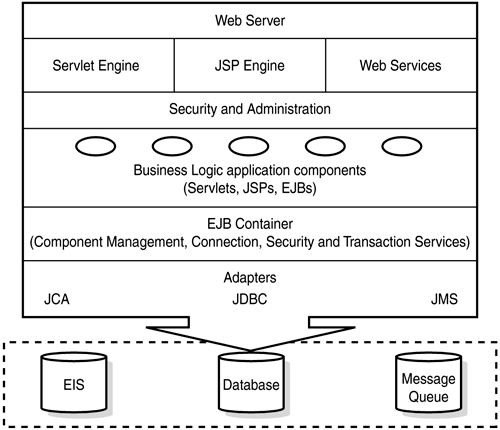| WebLogic Server provides a standards-based nonproprietary platform to develop and deploy enterprise applications. WebLogic Server 7.0 is fully compliant with the Java 2 Enterprise Edition (J2EE) 1.3 specification and supports all the technologies that belong to the J2EE 1.3 specification. Figure 1.1 shows the internal composition of WebLogic Server 7.0. You will now take a look at each of these parts in turn to familiarize yourself with them. In coming days you will study each of these areas in detail. Figure 1.1. WebLogic Server 7.0 internals.
Web server WebLogic Server contains a built-in Web server capable of handling concurrent browser requests. The Web server inside WebLogic Server supports the HTTP 1.0 and HTTP 1.1 protocols. This Web server is the point of entry for handling requests from browser client applications. These requests are routed internally in WebLogic Server to any of the appropriate containers or engines that can process the browser requests. WebLogic Server provides the ability to use third-party Web servers, such as Apache, instead of the internal Web server. Servlet engine To support execution of Java servlets, which process browser client requests, WebLogic Server contains a high-performance servlet engine. JavaServer Pages engine The JavaServer Pages (JSP) engine in WebLogic Server is used to process and execute Web applications written as JavaServer Pages. Web Services An entirely new technology supported by WebLogic Server is Web Services. WebLogic Server is capable of handling and processing Simple Object Access Protocol (SOAP) messages from Web Services client applications. Security and administration Security and administration form an integral part of WebLogic Server. Hence, WebLogic Server contains well-designed security and administration capabilities to enable administration of different applications deployed in WebLogic Server, as well as the server itself. Moreover, WebLogic Server contains a revamped security module to enable creation of users, granting of access rights for applications, allocation of resources, and so on. EJB container The EJB container in WebLogic Server supports the deployment and execution of Enterprise JavaBeans application components. The EJB container in WebLogic Server 7.0 supports the Enterprise Java Beans 2.0 specification. The EJB container provides application components with services such as life-cycle services, connection management, transaction management, and security management. These services are based on industry-standard specifications, thus enabling all standard-compliant applications to leverage and use these services. The EJB container supports the handling and processing of requests from client applications that use Remote Method Invocation (RMI), T3 (WebLogic Server internal), Java Naming and Directory Interface (JNDI), Internet Inter-Orb Protocol (IIOP), Simple Object Access Protocol (SOAP), and so on. To enable applications to leverage transactional support, WebLogic Server also supports the Java Transaction API. Business logic application components WebLogic Server supports the development and deployment of enterprise applications. For this purpose, it supports an entire suite of standards-based J2EE technologies. Enterprise applications built using different technologies, such as Java servlets, JavaServer Pages, and Enterprise JavaBeans, can be deployed and executed on WebLogic Server 7.0. Adapters To enable applications deployed on WebLogic Server to access information sources such as databases and enterprise information systems, WebLogic Server provides different adapters. These adapters range from Java Database Connectivity (JDBC) adapters for relational databases such as Oracle, Sybase, and Informix to J2EE Connector Architecture compliant resource adapters for accessing data from enterprise information systems such as SAP, Siebel, and so on. Additionally, for asynchronous access, WebLogic Server supports the Java Message Service specification. WebLogic Server 7.0 supports different technologies to enable integration of diverse technologies in a single unified platform. WebLogic Server is widely used in the industry not only because of its reliability but also for the many tools that it provides for developers. These tools enhance the productivity of developers and result in reduced development times. You can look at a brief overview of some of these tools at the end of today's session. |
